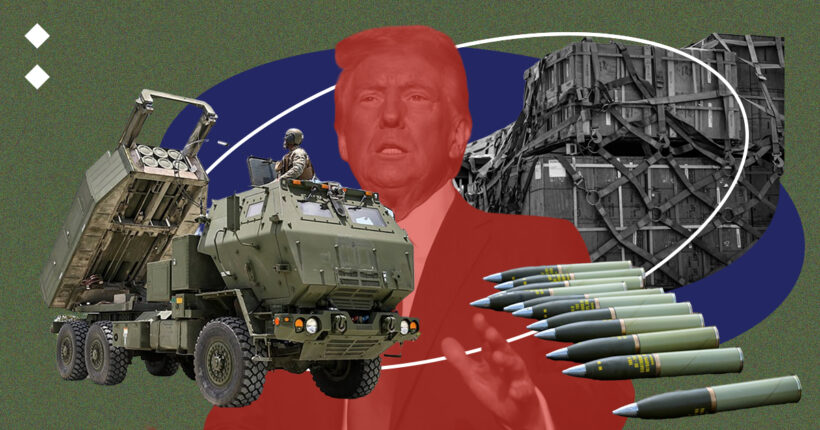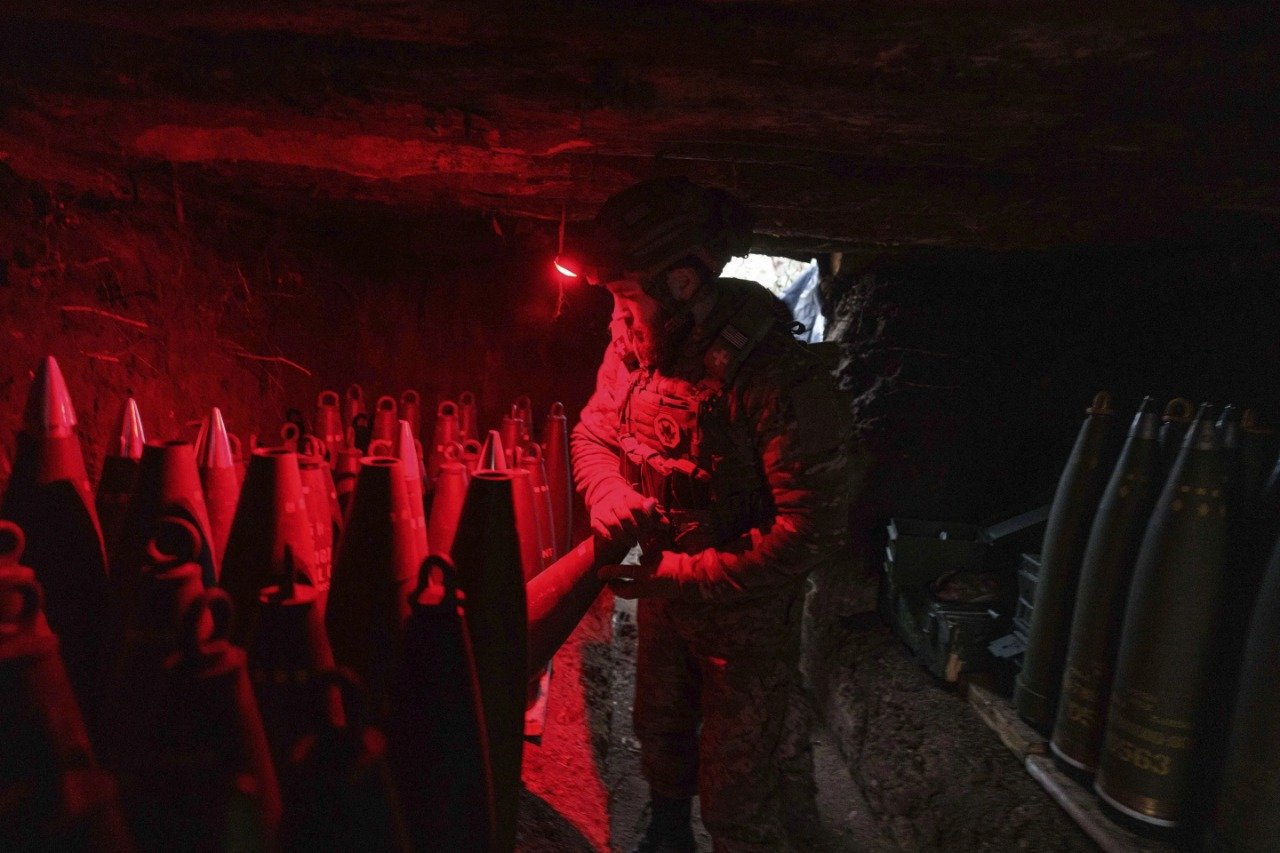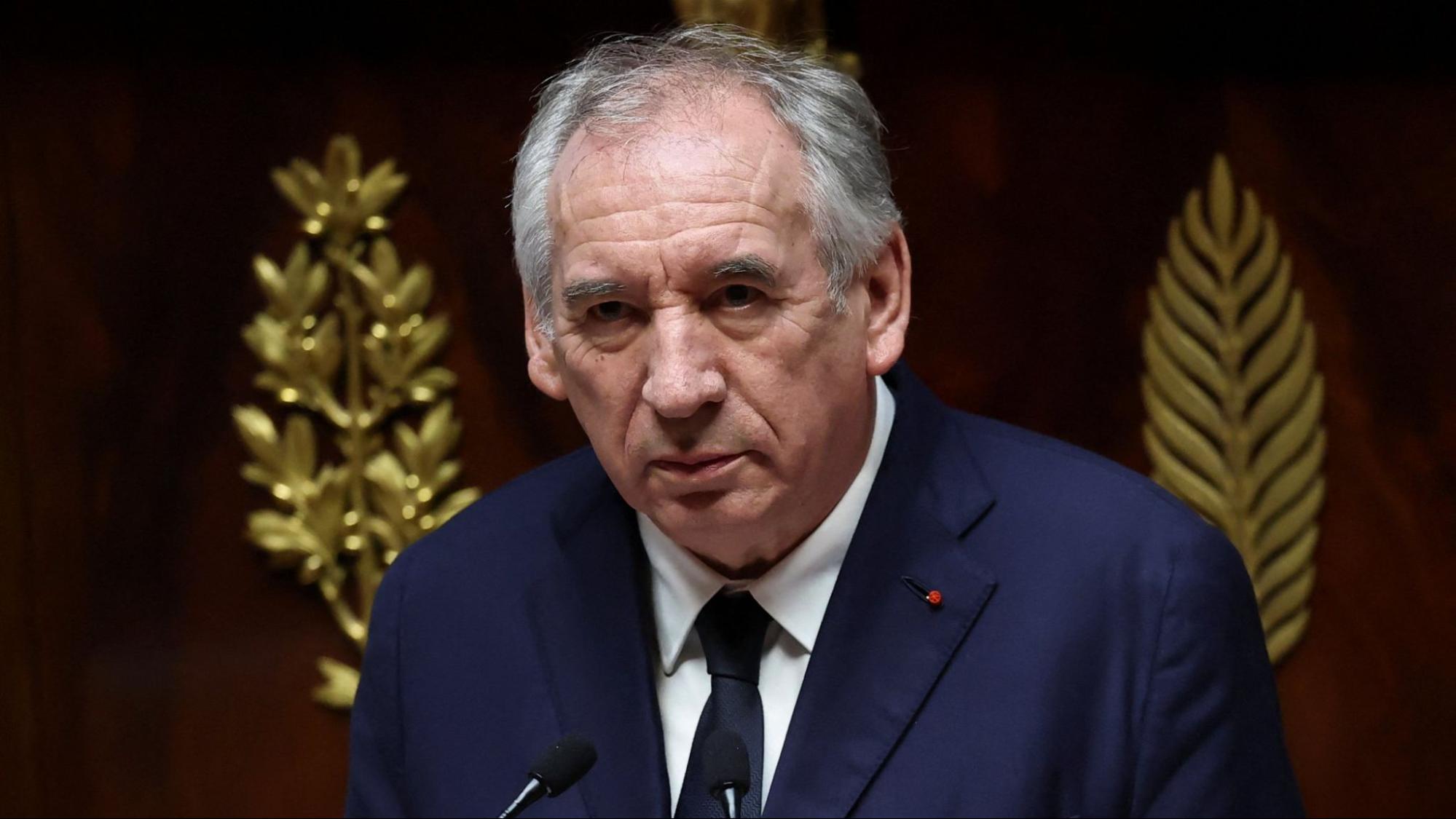
On March 4, media outlets including CNN, Bloomberg, and Voice of America, citing unnamed officials from the US Department of Defense and the White House, reported that the United States had halted all military aid to Ukraine, including shipments authorized by former President Joe Biden.
According to Bloomberg, the pause affects all US military equipment that has not yet reached Ukraine. This includes weapons currently in transit on planes and ships, as well as those waiting in transit zones in Poland.
The exact scale of the suspended shipments is unclear. However, under former President Biden's plans, the US was set to send $3.85 billion worth of weapons from its stockpiles.
Bloomberg also reports that the freeze includes critical ammunition, hundreds of guided multiple launch rocket systems, anti-tank weapons, and more. Voice of America journalist Ostap Yarysh adds that the decision may affect air defense missiles and HIMARS ammunition. Bloomberg further notes that only American Patriot systems are capable of intercepting Russian ballistic missiles.

A soldier from the 148th Artillery Brigade prepares 155 mm shells. Illustrative photo: AP Photo/Evgeniy Maloletka
According to Fox News, citing a senior Trump administration official, US military aid to Ukraine will remain suspended until "Ukrainian leaders show more appreciation for US support and a commitment to peace."
"President Trump has been clear that he is focused on peace. We need our partners to be committed to that goal as well. We are pausing and reviewing our aid to ensure that it is contributing to a solution," the report states.
European Pravda, citing The Wall Street Journal, reports that Trump's decision to suspend aid was supported by all of his top national security advisers after multiple meetings on the issue. Allegedly, Trump made this decision out of frustration with Volodymyr Zelensky's remarks suggesting the war could drag on. By halting aid, he aimed to signal his seriousness about pushing Ukraine toward negotiations.
Additionally, Trump still needs to determine what would qualify as Ukraine's readiness for peace talks. According to WSJ sources, it remains unclear whether the signing of the so-called minerals deal between Ukraine and the United States would be enough to resume arms shipments.
On the evening of May 4, US Vice President J.D. Vance stated that resuming aid to Ukraine remains a possibility, but only if Kyiv agrees to "come to the table and start negotiating," CNN reports.
"We want the Ukrainians to have a sovereign and independent country. We think the Ukrainian troops have fought very bravely, but we're at a point here where neither Europe nor the United States nor the Ukrainians can continue this war indefinitely," Vance said. He emphasized that this makes negotiations essential for all parties involved.
The vice president added that Trump is sending a clear message: Ukraine must engage in negotiations and begin talks with the US president on a potential minerals deal, which, according to Vance, is still on the table.
Impact of US aid suspension
Vladyslav Faraponov, head of the Institute of American Studies, told Rubryka that US military aid to Ukraine has been delivered through two main programs. The first, the Presidential Drawdown Authority (PDA), provides weapons directly from US stockpiles. The second, the Ukraine Security Assistance Initiative (USAI), funds the purchase of military equipment from defense contractors, with deliveries taking several months or longer. According to Faraponov, contracts under the USAI program are long-term, extending through 2026 and beyond, making them difficult to cancel or immediately halt.
However, if military aid is fully suspended, it will have serious consequences for Ukraine's combat capabilities, CNN reports, citing officials and analysts. Western officials estimate that Ukraine can likely sustain its current level of fighting for several weeks—possibly until early summer—before the US aid freeze begins to take a major toll. If the pause continues, Ukraine's ability to conduct deep strikes against Russian rear positions, which relies in part on ATACMS missiles, will also be affected.
The report also highlights that European countries could step in to replace US artillery supplies, supplemented by Ukraine's own defense industry. However, the most advanced weapons used by the Ukrainian armed forces still come from the United States.
Faraponov argues that Europe cannot fully replace American aid due to its more limited production capacity. Instead, he suggests an alternative approach: securing financial support from European or other partners to purchase or lease American weapons.
Meanwhile, Mark Cancian, a senior advisor at the Center for Strategic and International Studies, told CNN that halting US aid would have a "dire" effect on Ukraine. He estimates that Ukraine will begin to feel the full effects of the pause within two to four months, though for now, European assistance is helping the country remain in the fight.
Kanchian comments that Ukraine's front lines "would continue to buckle and eventually they would break and Ukraine would have to accept an adverse – even catastrophic – peace settlement."
CNN also quotes a European official who called the Trump administration's decision to suspend military aid to Ukraine "petty and wrong." The official noted that this would immediately deepen distrust of the US government among the Ukrainian people. In addition, he predicted that this would cause "unnecessary civilian casualties," since Ukraine would allegedly not be able to defend itself from Russian air attacks after it runs out of air defense missiles.
At the same time, ABC News, citing sources, writes that Ukraine has received 90% of the weapons that former US President Joe Biden announced under the PDA program. Under this program, Kyiv received weapons from American warehouses on the personal instructions of the head of the White House. The remaining 10% of the aid that has not yet been sent is armored vehicles and equipment for them, which were planned to be delivered by August 2025. At the same time, ABC News actually confirms Faraponov's words and says that a stable flow of weapons from the United States to Ukraine will probably continue for at least the next few years. This is thanks to contracts that Ukraine has concluded with private American companies for the supply of new types of weapons, many of which have already been paid for.
Ukraine's response
On the evening of March 4, Ukrainian President Volodymyr Zelensky addressed the situation. In his nightly speech, he stated that he had instructed the Ukrainian Defense Minister, intelligence chiefs, and diplomats to contact their US counterparts to obtain official information regarding the suspension of aid.
"People should not guess. Ukraine and America deserve a respectful dialogue, a clear position from each other. Especially when it comes to protecting lives," Zelensky said.
He also noted that Ukraine had already received indications of a possible aid suspension. As a result, both the military and special services had time to develop a plan of action in response to the situation.
On the eve of this, President Zelensky posted on the social network X, stating that Ukraine is ready to engage in negotiations "under the strong leadership of President Trump" as soon as possible. He expressed gratitude for the US role in preserving Ukraine's independence and sovereignty, as well as for the "turning point" when the Trump administration provided Kyiv with Javelin missiles.
"Our meeting in Washington, at the White House, on Friday did not go as planned. It is a pity that this happened. It is time to do everything right. We would like further cooperation and communication to be constructive," Zelensky wrote.
He also emphasized that Ukraine is prepared to sign a minerals deal at any time and in any format. According to him, this agreement would contribute to strengthening security and ensuring reliable security guarantees.
Faraponov noted that Zelensky's post included all the key elements needed to satisfy the US administration—particularly his expression of gratitude to Trump. According to the expert, the message aligns with the conditions the US has set for resuming aid.
Notably, President Trump referenced Zelensky's statement in his first speech to Congress after his re-election, which took place on March 5. He thanked the Ukrainian president for his remarks and highlighted the hundreds of billions of dollars in military aid the US had provided to Ukraine without loans. However, he did not mention the suspension of assistance to Kyiv.

Trump's speech to Congress. Photo: Win McNamee/Pool/AP
Earlier, on March 4, Ukrainian Prime Minister Denys Shmyhal held a press conference, during which he stated that there was no confirmed information about a suspension of US military aid, Suspilne reports.
"According to the Minister of Defense, aid from the United States is continuing. The assistance that was allocated in packages under the previous administration was arriving in Ukraine, and as of yesterday evening, we had no information about a suspension. All packages were being delivered. As of this morning, there was no information about any changes from the Minister of Defense. If there were, I would have informed you," Shmyhal said.
Meanwhile, Mykhailo Podoliak, an advisor to the Head of the President's Office, stated that Ukraine is currently conducting a thorough audit of the US aid that has already been delivered, as many American programs are nearing completion. Additionally, he noted that Ukraine is evaluating potential areas for further partnership cooperation and exploring possible alternatives to replace certain aid.
"We are looking for options on commercial markets. We are discussing this with European partners. At the same time, we are not ruling out the possibility of negotiations with our American partners," wrote a representative of the President's Office.
In a comment to RBC-Ukraine, People's Deputy and member of the Ukrainian parliament's Defense Committee, Fedir Venislavskyi, stated that Ukraine has a margin of safety for about six months, even without consistent US support. However, he noted that both the presidential team and the parliament are actively working on ways to compensate for the quantity and quality of weapons that the US may stop providing.
"Our military-industrial complex has developed significantly over the past three years and is capable of mitigating many of the risks and threats that may arise due to this situation. However, there are certain types of weapons that will be extremely difficult to replace, as only the US can supply them," Venislavskyi told RBC-Ukraine.
The MP emphasized that the primary challenge is finding alternatives to American air defense systems and high-precision, long-range MLRS.
Meanwhile, Oleksandr Merezhko, head of the Verkhovna Rada Committee on Foreign Policy, described the suspension of US aid as a "shocking decision" in a comment to ABC News. He also stated that "Trump is helping Putin kill Ukrainians."
Europe's response
The French government responded to the suspension of US aid to Ukraine. According to the French media outlet BFM TV, the junior minister for European affairs, Benjamin Haddad, said that the Trump administration's decision "repels" peace in Ukraine.
French Prime Minister François Bayrou, speaking at the National Assembly, stated that France and Europe must "combine all possible means to replace as much as possible" the American military aid to Ukraine that was suspended by the Trump administration.
Bayrou emphasized that Ukraine needs ammunition, "a certain number of intelligence systems," and access to "networks and communications."
"This will force us to rethink our model, our priorities, and look differently at the world that we thought we knew—a world that, as we have discovered, is more dangerous than we imagined, and where the threats come from those we considered our allies," Bayrou said.

French Prime Minister François Bayrou delivers a speech at the National Assembly in Paris, France, on March 3, 2025. Illustrative photo: REUTERS/Stephane Mahe
Even the de facto leader of France's far-right National Rally party, Marine Le Pen—known for her pro-Russian views—condemned the suspension of US aid to Ukraine. In an interview with Le Figaro, she stated that "the impudence of this decision is condemnable." While acknowledging that no one can force the United States to continue its support if Washington no longer wants to, Le Pen argued that "not giving Ukraine a reasonable time to adjust is very questionable."
Polish Prime Minister Donald Tusk confirmed during a government meeting that the United States has halted military aid to Ukraine.
"The reports coming from the border, from our hub in Jasionka, confirm the statements from the American side. This, of course, puts Europe, Ukraine, and Poland in a more difficult situation, but we must face this reality," Tusk said.
Meanwhile, Polish Foreign Ministry spokesman Pawel Wronski told Reuters that the US decision to suspend military aid to Ukraine was made without consulting or informing its allies—a statement quoted by The Guardian.
In response to the situation, the European Union unveiled a five-stage plan to strengthen the EU's defense capabilities and support Ukraine. The plan involves mobilizing €800 billion, including a 150-billion-euro loan for defense purposes. These funds will be used to produce air defense systems and modernize defense infrastructure across EU member states.
Additionally, Friedrich Merz, leader of Germany's Christian Democratic Union (CDU) and a potential candidate for chancellor, expressed hope that the current Bundestag will approve an additional 3 billion euros in military aid to Ukraine before its term ends. According to Deutsche Welle, the current chancellor and parliament will remain in office until March 25 at the latest.
US response
As reported by Ostap Yarysh, Democratic Senator Jeanne Shaheen, co-chair of the Senate Foreign Relations Committee, strongly criticized the suspension of US aid to Ukraine:
"This act of retaliation against our ally, who is on the front lines of defending freedom and democracy, is not only shameful—it is dangerous… I call on the administration to change course." According to Yarysh, other Democratic lawmakers have made similar statements.
On the other hand, Republican Congressman Chip Roy told CNN, as quoted by the Voice of America journalist, that Donald Trump could have halted military aid to Ukraine even sooner.
"This is what the president should have done. Frankly, he could have done it before Friday's showdown with Zelensky. The president said there are three ways: either you lose, or you drag us into a war, or you conclude a truce. And the president is right to choose a truce," Roy stated.
However, not all Republicans support the Trump administration's decision. According to CNN, Republican Senator Susan Collins condemned the pause in aid, arguing that the US must continue backing its ally.
"This is a critical time for Ukraine. Last year, I led a supplementary project that provided additional assistance to Ukraine, and I do not think we should stop our efforts. It is the Ukrainians who are shedding blood," Collins said.
Republican Congressman Mike Lawler, who represents New York in the US House of Representatives, warned that "termination of support for Ukraine would jeopardize the stability of Europe and the free world."
Similarly, Don Bacon, a Republican member of the House of Representatives and a retired US Air Force Brigadier General, emphasized that in the Russian war against Ukraine, there is a clear aggressor, and the US should stand "on the side of good."





